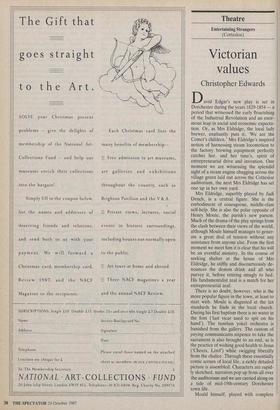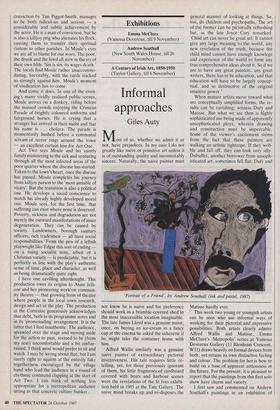Theatre
Entertaining Strangers
(Cottesloe)
Victorian values
Christopher Edwards
David Edgar's new play is set in Dorchester during the years 1829-1854 — a period that witnessed the early flourishing of the Industrial Revolution and an enor- mous leap in social and economic expecta- tion. Or, as Mrs Eldridge, the local lady brewer, exultantly puts it, 'We are the Comet's children.' Mrs Eldridge's inspired notion of harnessing steam locomotion to the factory brewing equipment perfectly catches her, and her time's, spirit of entrepreneurial drive and invention. One moment we are witnessing the splendid sight of a steam engine chugging across the village green laid out across the Cottesloe auditorium, the next Mrs Eldridge has set one up in her own yard.
Mrs Eldridge, superbly played by Judi Dench, is a central figure. She is the embodiment of courageous, middle-class self-help. She is also the polar opposite of Henry Moule, the parish's new parson. Much of the drama of the play springs from the clash between their views of the world, although Moule himself manages to gener- ate a great deal of tension without any assistance from anyone else. From the first moment we meet him it is clear that his will be an eventful ministry. In the course of seeking shelter at the house of Mrs Eldridge, he stiffly and discourteously de- nounces the demon drink and all who purvey it, before retiring smugly to bed. His fundamentalist zeal is a match for her entrepreneurial zeal.
There is no doubt, however, who is the more popular figure in the town, at least to start with. Moule is disgusted at the lax standards he finds in the local church. During his first baptism there is no water in the font Oast vicar used to spit on his hand'). The tuneless yokel orchestra is banished from the gallery. The custom of paying communicants sixpence to take the sacrament is also brought to an end, as is the practice of wishing good health to Jesus (Cheers, Lord') while swigging liberally from the chalice. Through these essentially comic scenes of local life, a richly detailed picture is assembled. Characters are rapid- ly sketched, narrators pop up from all over the auditorium and we are carried along on a tide of mid-19th-century Dorchester town life.
Mould himself, played with complete conviction by Tim Piggot-Smith, manages to be both ridiculous and serious — a considerable and subtle achievement by the actor. He is a man of conviction, but he is also a killjoy prig who alienates his flock, causing them to transfer their spiritual custom to other parishes. In Moule's eyes we are all to blame for our woes. The poor, the drunk and the lewd all stew in the sty of their own filth: 'Sin is sin, its wages death.' The locals find Moule rather unaccommo- dating. Inevitably, with the cards stacked so strongly against him, Moule's moment of vindication has to come.
And come it does. In one of the even- ing's many vividly realised public scenes, Moule arrives on a donkey, riding before the massed crowds enjoying the Crimean Parade of brightly coloured uniforms and fairground horses. He is crying that a stranger has arrived in their midst and that his name is . . . cholera. The parade is momentarily hushed before a communal scream of terror rings around the town — an excellent curtain line for Act One.
Act Two sees Moule and his saintly family ministering to the sick and venturing through all the most infected areas of the poor quarter where the disease has started. Taken to the town's heart, once the disease has passed, Moule completes his journey from killjoy parson to the 'most amiable of vicars'. But the transition is also a political one. He develops a social conscience to match his already highly developed moral one. Moule sees, for the first time, that suffering can exist where none is deserved. Poverty, sickness and degradation are not merely the outward manifestations of inner degeneration. They can be caused by society. Landowners, borough sanitary officers, rich tradesmen — all have social responsibilities. From the pen of a leftish playwright like Edgar this sort of ending on a rising socialist note, albeit of a Christian variety — is predictable, but it is perfectly in line with the play's authentic sense of time, place and character, as well as being dramatically quite right.
I have one cavilling afterthought. This production owes its origins to Anne Jelli- coe and her pioneering work on commun- ity theatre — that growing form of theatre where people in the local town research, design and act in the play. The production at the Cottesloe generously acknowledges that debt, both in its programme notes and in its 'promenading' arrangement. It is the latter that I find inauthentic. The audience, sprawled over the stage and moving aside for the action to pass, seemed to be (from my seat) uncomfortable and a bit embar- rassed. I think most would prefer to sit and watch. I may be wrong about that, but I am surely right to squirm at the entirely fake togetherness encouraged by the village band who lead the audience in a round of rhythmic command clapping at the start of Act Two. I can think of nothing less appropriate for a metropolitan audience sitting in that concrete culture bunker.



















































 Previous page
Previous page